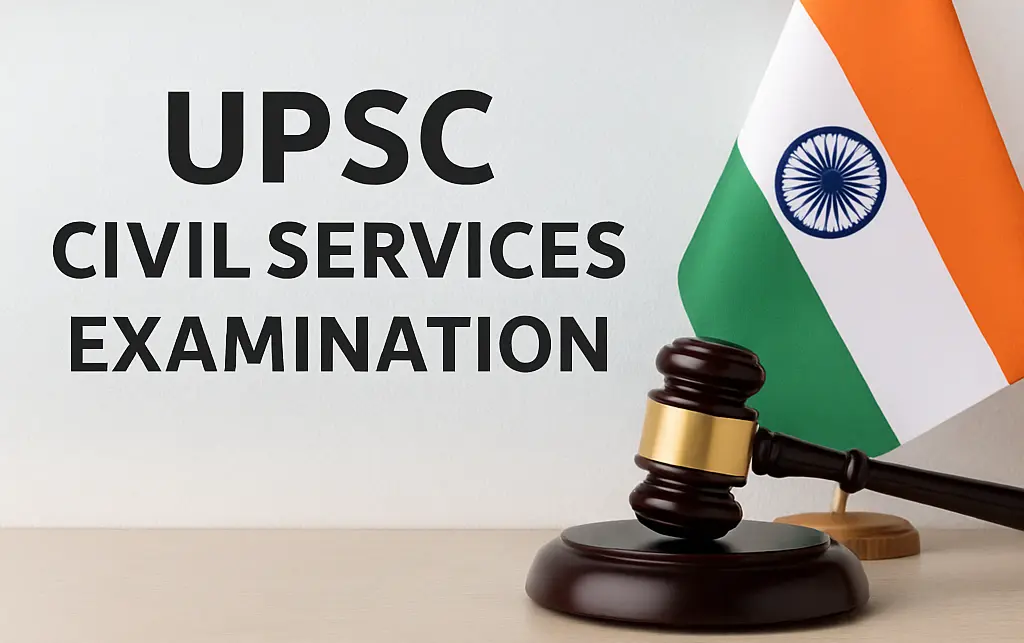UPSC (Union Public Service Commission) conducts India's most prestigious civil services examination to recruit officers like IAS, IPS, IFS, and more. This guide explains eligibility, exam stages, subjects, attempts, salary, and preparation strategies in detail.
What is UPSC Civil Services Examination?
The Civil Services Examination (CSE) is conducted annually by the UPSC to select candidates for various Group A and Group B services in the central government. These services include Indian Administrative Service (IAS), Indian Police Service (IPS), Indian Foreign Service (IFS), Indian Revenue Service (IRS), and many others. It is widely regarded as one of the most challenging competitive exams in India, known for its vast syllabus, high competition, and the significant roles offered upon selection.
Stages of the UPSC Exam
The Civil Services Examination is conducted in three phases:
- Preliminary Examination: This is an objective-type exam comprising two papers — General Studies (GS) and CSAT. It is only qualifying in nature and serves as a screening test for the Mains.
- Main Examination: This is a descriptive written test consisting of nine papers. Seven papers are counted for merit, while two (English and a regional language) are qualifying.
- Personality Test (Interview): Candidates who qualify the Mains appear for a personal interview before a UPSC board to assess their suitability for a career in civil services.
Eligibility Criteria
- Nationality: Must be an Indian citizen (some exceptions for IFS and other services).
- Educational Qualification: A graduate degree in any stream from a recognized university.
- Age Limit:
- General Category: 21 to 32 years
- OBC: Up to 35 years (with 9 attempts)
- SC/ST: Up to 37 years (unlimited attempts)
- PwD: Additional relaxation as per rules
Number of Attempts
- General: 6 attempts
- OBC: 9 attempts
- SC/ST: Unlimited till age limit
- PwD: 9 (General/OBC), unlimited for SC/ST
Detailed UPSC Syllabus
Preliminary Examination:
- General Studies Paper I: History, Geography, Polity, Economy, Environment, Science & Technology, and Current Affairs
- CSAT (Paper II): Logical reasoning, analytical ability, basic numeracy, comprehension (qualifying only)
Main Examination:
- Essay Paper – Two essays to be written on topics of national/international relevance
- General Studies I – Indian History, Geography, Indian Society & Culture
- General Studies II – Indian Polity, Governance, International Relations
- General Studies III – Economy, Agriculture, Internal Security, Science & Tech
- General Studies IV – Ethics, Integrity, and Aptitude
- Two Optional Papers – Subject chosen by the candidate from a list (e.g., Sociology, Geography, Anthropology, PSIR)
- Qualifying Papers – English and Regional Language (from 8th Schedule)
UPSC Salary Structure and Perks
- Basic Pay: ₹56,100 per month (Level 10 of the 7th Pay Commission)
- Gross In-hand: ₹80,000 – ₹1,20,000 per month (including allowances)
- Additional Benefits: HRA, TA, DA, official residence, staff, vehicle, medical benefits
- Postings: Includes positions like District Magistrate, Commissioner, Deputy Secretary, Embassy Attaché, etc.
Why Choose UPSC?
A UPSC officer holds immense responsibilities and influence in policy-making, administration, and public service delivery. These roles contribute directly to nation-building and impact millions of lives. Apart from power and prestige, civil services offer lifetime job security, leadership opportunities, and avenues for foreign deputation, policymaking, and international exposure.
Preparation Strategy for Beginners
- Start with NCERT books (6th–12th) to build a strong conceptual foundation.
- Follow one newspaper daily (The Hindu / Indian Express) for current affairs.
- Use standard books like Laxmikanth (Polity), Spectrum (Modern History), GC Leong (Geography), and Economic Survey.
- Enroll in mock test series for Prelims and Mains answer writing practice.
- Prepare notes and revise regularly.
Additional Services Recruited via UPSC CSE
- Indian Audit and Accounts Service (IAAS)
- Indian Trade Service (ITS)
- Indian Corporate Law Service (ICLS)
- Indian Defence Accounts Service (IDAS)
- Indian Railway Personnel Service (IRPS)
- And several other Group A & Group B services
Conclusion
Cracking UPSC requires commitment, consistency, and clear vision. With proper planning and honest effort, lakhs of aspirants have turned their dreams into reality. If you aspire to serve the nation, influence policies, and make a real difference in people’s lives, UPSC Civil Services is your path forward.
